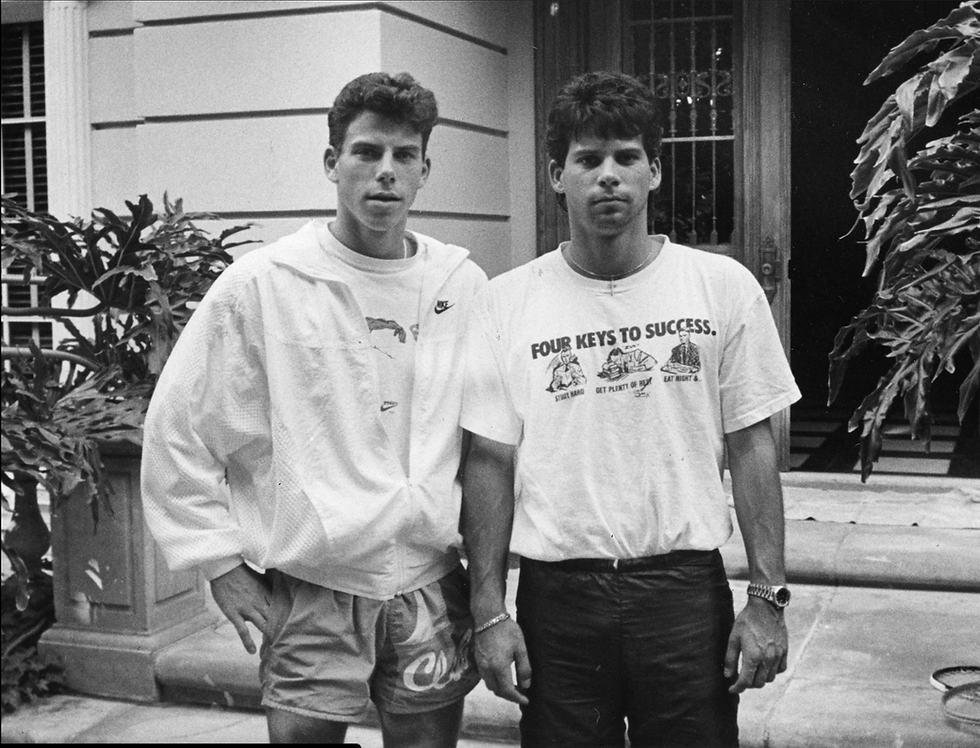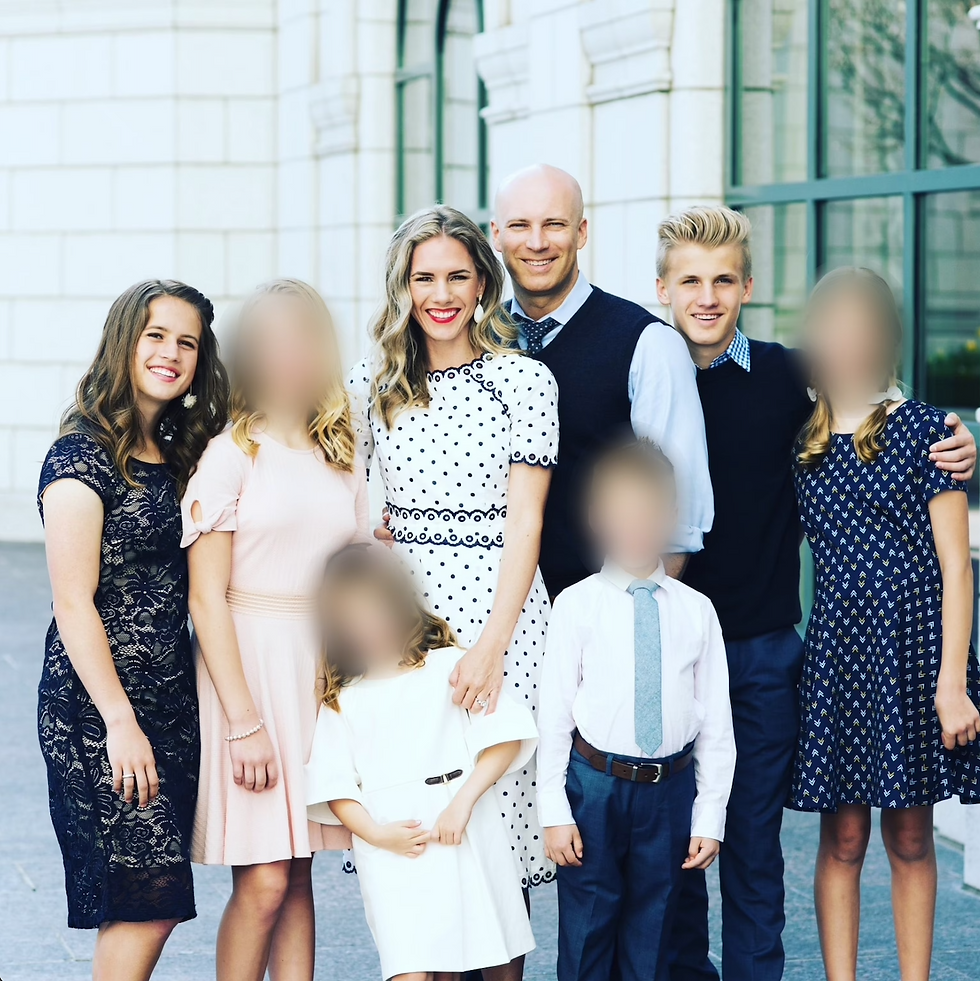INFAMOUS: Menendez Brothers
- Yasmin Sudarsanam
- Nov 9, 2024
- 6 min read
Trigger Warning: The following case includes depictions of graphic violence and potential violence against minors. Please read at your own discretion.
The Menendez brothers' case captivated the nation, becoming one of the most shocking and controversial criminal trials of the late 20th century. Known for its disturbing allegations of familial abuse, lavish spending, and a high-profile murder, the trial raised questions about justice, privilege, and psychological trauma that continue to resonate today. This is the story of the Menendez brothers.
José Enrique Menendez was born on May 6, 1944, in Havana, Cuba, but fled to the United States during the Cuban Revolution. Settling in Illinois, he attended Southern Illinois University, where he met Mary Louise "Kitty" Menendez. The two married in 1963 and soon moved to New York City, where José earned an accounting degree from Queens College. José’s ambition and drive were evident early on, and he quickly rose to executive positions at Hertz Corporation and RCA Records. Kitty, once an aspiring teacher, dedicated herself to their growing family and became the primary caretaker of their two sons, Joseph Lyle Menendez, known as Lyle, born on January 10, 1968, and Erik Galen Menendez, born on November 27, 1970.

The Menendez family relocated to New Jersey after Lyle's birth, where both brothers attended Princeton Day School. By then, José had become a highly respected business figure. His career eventually led the family to California, when he was appointed CEO of Live Entertainment. They settled in Calabasas, where Lyle and Erik would spend their teenage years. Despite the family’s outward appearance of success and privilege, trouble was brewing beneath the surface. In 1988, the brothers were caught stealing over $100,000 in cash and jewelry from homes in their neighborhood. The scandal forced the family to move once more, this time to a grand mansion in Beverly Hills. Erik began attending Beverly Hills High School, where he struggled academically but was recognized as a tennis prodigy, achieving a national junior ranking of 44. Despite his prowess on the court, his personal life remained tumultuous. He and his friends even penned a screenplay called "Friends," in which a wealthy young man kills his parents to inherit their fortune—an eerie foreshadowing of the events that would unfold.
Meanwhile, Lyle had enrolled at Princeton University, but his behavior was increasingly erratic. He developed a reputation for throwing out his roommates' belongings, leaving water running in sinks, and even repainting his room against university code. Academic struggles plagued him, resulting in poor grades, probation, and eventually suspension for plagiarism.
On August 18, 1989, Lyle and Erik visited multiple gun stores, attempting to purchase handguns but were thwarted by California's two-week waiting period and issues with Lyle's driver’s license. Undeterred, they acquired two Mossberg 12-gauge shotguns, along with birdshot and buckshot ammunition, at a Big 5 Sporting Goods store using a stolen ID. Two days later, on the night of August 20, 1989, José and Kitty were relaxing in the den of their mansion when the brothers entered, firearms loaded. José was shot six times, while Kitty was shot ten times. Immediately after the attack, Lyle and Erik disposed of their blood-stained clothing and the weapons, which they buried along Mulholland Drive. They attempted to create an alibi by purchasing movie tickets but realized the tickets had time stamps. Instead, they attended the "Taste of LA" festival in Santa Monica before returning to the mansion to "discover" the crime scene, at which point Lyle called 911, exclaiming in apparent shock that "someone killed [his] parents."
When the police arrived, they failed to conduct gunshot residue tests on either brother, missing a key opportunity to verify their recent use of firearms. Both brothers provided false alibis to the officers, claiming they had been out all evening. Initially, the police suspected a mob-related hit due to José's high-profile business dealings. However, the investigation shifted when media coverage began highlighting the brothers' extravagant spending, which included buying luxury cars, watches, and even a restaurant within weeks of the murders. They moved into adjacent condos in Marina del Rey, dined at expensive restaurants, and took international vacations, spending a staggering $700,000 in a matter of months.
Further suspicion arose when it was discovered that Erik had confided in a high school friend, Craig Cignarelli, admitting to the murders. Although police initially used Cignarelli as an informant, having him wear a wire during a lunch meeting with Erik, Erik denied the allegations. However, during therapy sessions with psychologist Jerome Oziel, both brothers confessed. Oziel secretly recorded these sessions, and when he shared the confession with his mistress, Judalon Smyth, she informed the police after their breakup. The brothers were subsequently arrested and charged with first-degree murder, with an added provision for “lying in wait,” which made them eligible for the death penalty, as well as conspiracy to murder.

A crucial pre-trial matter was the admissibility of Oziel's tapes. Judge James Albrecht initially ruled the tapes admissible, citing that Lyle had waived doctor-patient confidentiality by threatening Oziel. This ruling was appealed and eventually upheld by the California Supreme Court, with most tapes admitted as evidence except one detailing Erik’s confessions. The legal delays stretched the proceedings by two years. In their first trial, the brothers’ defense argued that they had acted in self-defense after years of alleged abuse, claiming their father was an abusive perfectionist and their mother was an enabler, addicted, and unstable. They testified that they had feared for their lives when José allegedly threatened to kill them if they revealed the abuse. Erik’s high school friend, Diane Vander Molen, corroborated the abuse allegations, claiming that Lyle had confided in her years earlier. However, the prosecution contended these accusations were fabricated to gain sympathy, asserting the brothers had murdered their parents to gain their multimillion-dollar inheritance, recently reduced in José's updated will.
During the trial, Oziel’s tapes were presented, in which the brothers discussed planning the murders in advance. The prosecution argued that the abuse allegations were a defense strategy that had only surfaced months after the murders. To sway the jury, they played the 911 call, claiming it demonstrated Lyle's ability to lie convincingly under stress. Further damaging the defense, it was revealed that Lyle had attempted to bribe an ex-girlfriend into testifying that José had made advances toward her, a scheme she reported to the police. Ultimately, the first trial ended in a mistrial, with jurors divided largely along gender lines: female jurors were inclined toward voluntary manslaughter, while male jurors maintained the charge of first-degree murder.
In the second trial, the defense arguments remained similar, but cameras were banned to reduce public influence. Erik testified extensively about the alleged abuse, while Lyle did not, though a letter from him detailing instructions for friends on how to testify surfaced as further evidence against him. This time, the brothers were convicted of first-degree murder and sentenced to life without parole. The brothers began their sentences at the Richard J. Donovan Correctional Facility in San Diego, where they continue to serve time.

Since their sentencing, Lyle Menendez has earned a bachelor’s degree in Sociology through a program with UC Irvine and founded the Green Space Project, a prison reform initiative aimed at creating more rehabilitative environments through murals and planting trees. Over the years, both brothers filed numerous appeals, each ultimately denied. However, in October 2024, LA District Attorney George Gascón recommended a resentencing after a new habeas corpus petition was filed. This came in light of renewed allegations by former Menudo member Roy Rosselló, who publicly supported the brothers’ claims of abuse. Gascón also requested clemency from the California governor, urging their immediate release and highlighting their “exemplary” prison records, including their work in counseling and mentoring fellow inmates.
Yet, Gascón’s actions may be influenced by more than just the merits of the case; he is currently campaigning for re-election as LA District Attorney and is narrowly trailing his challenger. The timing of his clemency petition has raised questions, as an incoming district attorney could withdraw Gascón’s request if elected. In a statement on October 30, Gascón’s office emphasized that the clemency petition was unrelated to his campaign, yet the impending election will likely shape the case’s outcome. The resentencing trial is set to begin on December 11, 2024, and its future could hinge on the results of Gascón’s re-election bid.
Feel free to leave your thoughts, opinions, and questions below!
Thank you to Viji for suggesting this case; if you have a specific case you would like me to cover, please leave it in the suggestion box!
Sources:




Comments